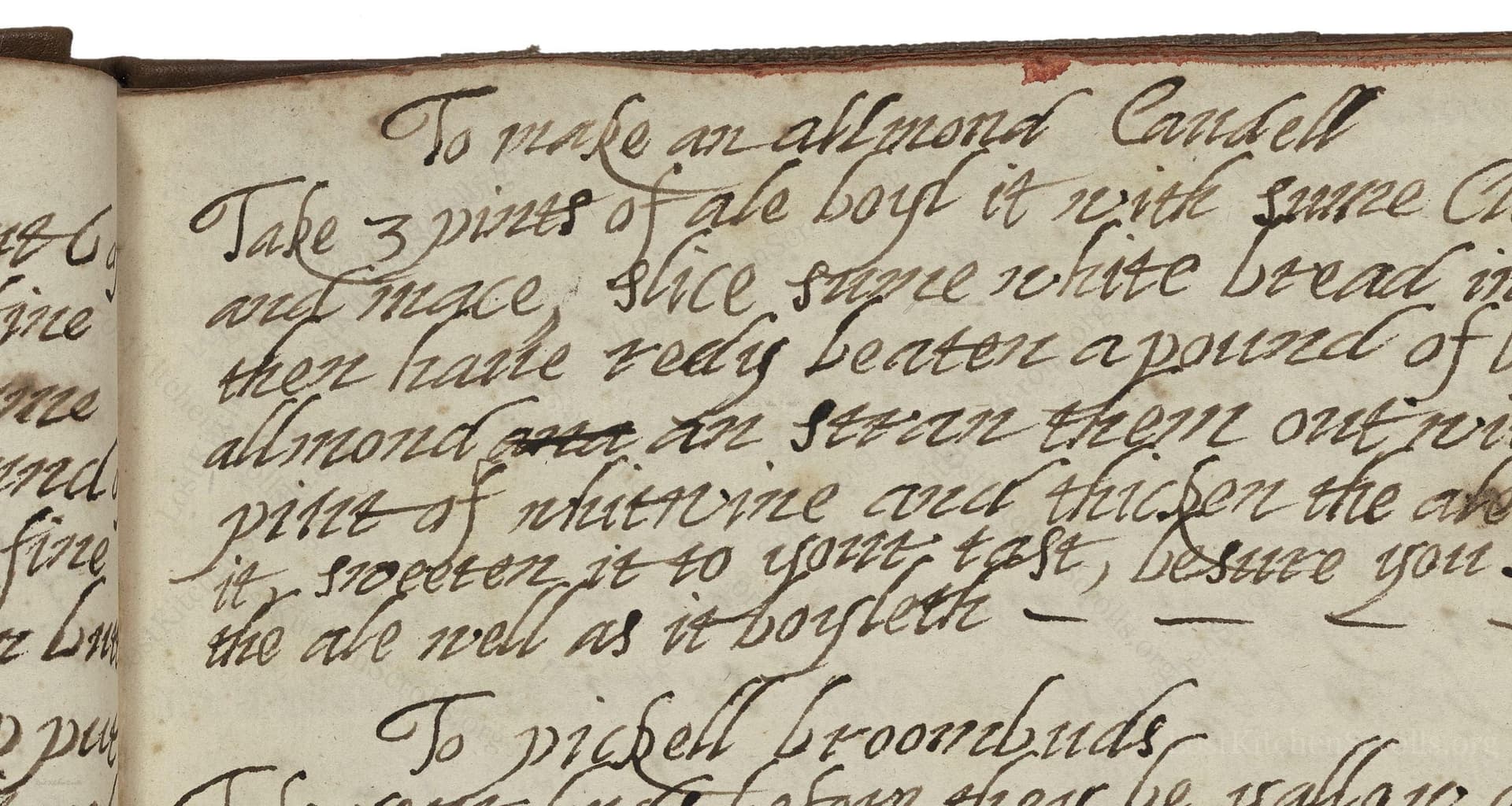To Make An Allmond Causdell
From the treasured pages of Cookbook of Constance Hall
Written by Constance Hall

To Make An Allmond Causdell
"Take 3 pints of ale boyl it with some Cloues and mace, slice some white bread in it then haue ready beaten a pound of Blancht allmond and strain them out with a pint of whietwine and thicken the ale with it, sweeten it to your tast, Desire you skim the ale well as it boyleth."
Note on the Original Text
The original recipe is concise, presuming the reader’s familiarity with kitchen processes and medieval English spelling conventions (e.g., 'boyl' for boil, 'Causdell' for caudle). Amounts are mostly inferred by modern cooks; past writers gave rough pointers ('a pound of Blancht allmond', 'a pint of whietwine'), expecting adaptation based on household size and local availability. The instruction to 'skim the ale well as it boyleth' reflects the importance of clarity and refinement in period cooking.

Title
Cookbook of Constance Hall (1672)
You can also click the book image above to peruse the original tome
Writer
Constance Hall
Era
1672
Publisher
Unknown
Background
A spirited foray into 17th-century kitchens, this collection by Constance Hall brims with the flavors, secrets, and delicacies of Restoration-era England—perfect for cooks keen to revive a dash of history in their modern menus.
Kindly made available by
Folger Shakespeare Library
This recipe for 'allmond Causdell' comes from the 1672 manuscript collection of Constance Hall, a woman actively compiling culinary and medicinal recipes in Restoration England. Almond caudle is part of a broader tradition of nourishing, thickened drinks—popular both as comforts for the sick and as rich treats at the breakfast table or after feasts. In Hall's world, caudles were trusted to restore and delight, drawing on almonds’ association with health, and often featuring strong flavors like ale, wine, and spices imported from distant lands. Ingredients like almonds and white wine signal an aspirational, upper-middle-class household eager to display its taste and resources.

In the late 17th century, this recipe would be made over an open fire or at a hearth using sturdy iron or brass pots for boiling ale. A wooden spoon or ladle was essential for stirring, and bread would be sliced with a long-bladed knife. Almonds were pounded in a mortar and pestle, then strained through linen or muslin bags—labor-intensive, but key for extracting creamy almond milk. A sieve or cloth would clarify the drink before serving, often in ceramic mugs or bowls.
Prep Time
15 mins
Cook Time
20 mins
Servings
6
We've done our best to adapt this historical recipe for modern kitchens, but some details may still need refinement. We warmly welcome feedback from fellow cooks and culinary historians — your insights support the entire community!
Ingredients
- 3 pints (6 cups) ale
- 4 whole cloves
- 0.5 teaspoon ground mace or 3–4 blades whole mace
- 3.5 ounces white bread slices (crusts removed if preferred)
- 5.3 ounces blanched almonds
- 8 fluid ounces (1 cup) dry white wine
- Sugar or honey, to taste
Instructions
- Begin by bringing 3 pints (6 cups) of good-quality ale to a gentle boil with 4 whole cloves and 1/2 teaspoon of mace.
- While the spiced ale heats, slice 3.5 ounces of plain white bread (with crusts removed) and set aside.
- In a separate bowl, grind 5.3 ounces of blanched almonds to a fine meal, then blend with 8 fluid ounces (1 cup) of dry white wine and strain through a fine sieve or muslin to extract the rich almond milk.
- When the ale is fragrant, skim off any foam as it boils, then add the bread slices to soak.
- Pour in the strained almond and wine mixture, stirring continuously to thicken the beverage without forming lumps.
- Sweeten to taste with sugar or honey, and serve warm for a comforting, creamy drink.
Estimated Calories
275 per serving
Cooking Estimates
Preparing this comforting, creamy drink takes about 15 minutes to get your ingredients ready and 20 minutes to cook everything together. Each serving has about 275 calories, and the recipe makes 6 servings.
As noted above, we have made our best effort to translate and adapt this historical recipe for modern kitchens, taking into account ingredients nowadays, cooking techniques, measurements, and so on. However, historical recipes often contain assumptions that require interpretation.
We'd love for anyone to help improve these adaptations. Community contributions are highly welcome. If you have suggestions, corrections, or cooking tips based on your experience with this recipe, please share them below.
Join the Discussion
Rate This Recipe
Dietary Preference
Culinary Technique

Den Bockfisch In Einer Fleisch Suppen Zu Kochen
This recipe hails from a German manuscript cookbook compiled in 1696, a time whe...

Die Grieß Nudlen Zumachen
This recipe comes from a rather mysterious manuscript cookbook, penned anonymous...

Ein Boudain
This recipe comes from an anonymous German-language manuscript cookbook from 169...

Ein Gesaltzen Citroni
This recipe, dating from 1696, comes from an extensive anonymous German cookbook...
Browse our complete collection of time-honored recipes



